- Home
- Janice Kay Johnson
Finding Her Dad Page 12
Finding Her Dad Read online
Page 12
Another one of those moments had come when Edie suggested he run a background check on Lucy. He’d almost taken her head off.
“Just to be on the safe side,” she said mildly.
“You want me to abuse my authority to run a check on someone for a personal reason. That would look great if it came out. Are you aware we fired a deputy for running background checks on all the guys his daughters dated?”
“Ah…no. I didn’t know that,” she admitted.
“I wouldn’t do it anyway,” he said, his voice hard. “I know everything I have to about Lucy. Give me some credit.”
“You pay me to foresee problems. I understand why you don’t want to hear this, but becoming involved in a romantic relationship at this point is dangerous, Jon. You haven’t known this woman very long. And the risks are especially high given that we’re trying to keep your daughter’s existence quiet.”
“Back off.” He’d hung up the phone, his gut churning.
Sitting at his desk, his chair swiveled so he could gaze out the window, he couldn’t help remembering the time he’d told Lucy he wanted to know her. He’d asked her to let him. What she’d said was, haltingly, “It’s…hard for me. But I’ll try.”
What had she meant by that? Was it the stuff she’d started to tell him about? The mother who apparently had a lot of boyfriends and didn’t provide an economically stable home for her daughter? The fact that Lucy’s birth seemed to have been an accident?
Or was there more? Things she hadn’t said yet? He wished he knew. It wasn’t only Edie’s suggestion that had him reaching for the antacids he kept in a desk drawer. It was the fact that he was so damned tempted to follow it. To cheat, and learn everything he could about Lucia Malone without waiting for her to trust him enough to share her secrets.
But even if Edie was right and Lucy was a threat to his campaign, this was one temptation he refused to give in to. How would he feel if their positions were reversed? If she was asking questions about him behind his back?
He’d feel betrayed, and he knew damn well she’d feel the same. He also knew it wasn’t something he would have considered for even a minute if it weren’t for the upcoming election.
Falling for somebody was always a risk. One he hadn’t taken in sixteen years. Not since he had loved Cassia and lost her in such a painful way.
Lucy was nothing like Cassia. Jon supposed he wasn’t much like the young man he’d been then, either. Cassia had been sunny. Completely without guile, capable of uncomplicated happiness. He’d loved that about her. She smiled in the morning before her eyes were open. She wanted to be a teacher, and she loved kindergarten-level humor. She’d call him out of the blue with a knock-knock joke, and have him laughing over something so dumb he wouldn’t dare to try to explain to anyone else. Cassia’s parents had been hippies who’d successfully run a health-food store in Ashland, Oregon. Her dad had long, graying hair he wore in a ponytail, and her mom had a braid of fading blond hair long enough to sit on. Compared to his parents, they’d been a revelation: accepting, warm, philosophical.
They’d called him several times after Cassia’s funeral. He hadn’t returned the calls. He’d managed to hug them and stand beside them as the urn containing her ashes was laid to rest, but he didn’t want to know what the loss of their only child had done to them.
No, admit it—he hadn’t been thinking of them at all. He’d been too consumed by an unholy combination of rage and guilt to spare much thought for anyone else.
Cassia was like water so clear, you knew looking that there were no undercurrents. No deep pools. You could see all the wonders swimming within.
Lucy was more like a deep spot at a crook of the White River. Not turbulent; the white water rushed past. You could lie on a rock and gaze into the green depths, catching occasional glimpses of a shadow shifting toward the bottom, but you wouldn’t be able to quite make out the shape. This seemingly quiet water held mysteries and possibilities, but no simple answers.
Why that appealed to him so much when he’d spent the past fifteen years trying to see the world in black and white, Jon couldn’t have said. He had two columns: right and wrong. Voters, he was learning, liked that about him. He generally tried not to listen to the inner doubting voice that whispered It’s not that easy.
Cassia would be alive if the wrong decision hadn’t been made. He had to hold to the rigid backbone of his beliefs. He’d become a cop for her; he’d become the kind of man he was because of her.
And yet there was an irony in knowing how much he’d changed. That now he was drawn to a woman full of complexity, shadows, compassion. No, Lucy was nothing like Cassia. Instinct told him that for Lucy, happiness didn’t come easily.
Jon worried about what his need for her said about him.
Would I still love Cassia if she’d lived?
The question was unanswerable. He wasn’t the same man he would have been if Cassia hadn’t been murdered.
Suddenly restless, Jon pushed back his chair and paced to the window.
Could Lucy Malone be dangerous for him?
Maybe.
But he was going to take the risk.
He picked up his cell phone, dialing her store number from memory.
“Barks and Purrs—may I help you?” she said.
“Are you free for lunch?”
LUCY STOOD ALONE in the middle of the empty apartment, hugging herself as if she were cold, and realized how much she hated the idea of bringing her mom here.
Which was dumb. Her mother would be living on public assistance initially, and Lucy couldn’t afford to help much. This place wasn’t that bad.
An old house had been carved into apartments in the fifties or sixties, at a guess, and not much had been remodeled since. This apartment was down a flight of concrete steps to the daylight basement. The high half window in the bedroom looked out to a weedy backyard, while the view from the main room was to a cement walkway, so her mom would see people’s feet going by. The refrigerator was an antique with a freezer that Lucy would have to defrost. The bathroom sink had rust stains. The linoleum was cracking. Woodwork had been painted so many times without being stripped that it was lumpy.
But it was clean, and it was cheap. The door was solid and had a good lock. The building was close enough to downtown that her mother could walk once she found a job. A bus stopped only a couple of blocks away, and the bus system offered excellent service throughout the county. There hadn’t been that many places listed for rent right now, not in Lucy’s price range. The apartment would do, if only temporarily.
After she’d paid the deposit, the landlord had left her alone. She’d intended to make a list of the absolute basic furnishings she’d need to find at garage sales before her mom got here. But so far she wasn’t doing anything but standing stock-still dealing with feelings she hated to examine.
She forced herself to anyway.
It didn’t take much self-analysis to realize that she didn’t like the apartment because she’d lived in too many places like it. No, worse places than this. There had been one basement apartment like this when Lucy was…she didn’t remember. Seven or eight, maybe. For a while it had been only Lucy and her mom living in it, but then a man joined them. She could see his face, but couldn’t remember his name. Looking back, she guessed he’d been selling drugs. Strangers came and went at all hours. The curtains were kept drawn no matter how nice the day outside. Her mother pretended everything was great, but Lucy had mostly been scared. She’d tried to be invisible.
Lucy ate whatever she could find in the morning and at school always insisted she’d forgotten her lunch money. After the first few times, the cafeteria ladies gave her a peanut-butter sandwich and that was all. She hated going home at the end of the day. For some reason, she had a vivid memory of walking down a cracked sidewalk scuffing her feet, going as slowly as she possibly could.
She remembered the night when the police came and bundled her mother into the back of a squad car along wit
h the man. It had happened other times, outside other apartments and houses, but that one stood out in her memory. As they led Lucy to another car, her mom was struggling and sobbing, “My baby! Who’ll take care of my baby?” Lucy had strained to look over her shoulder, and tears had streamed down her face, and yet somewhere inside she was…relieved.
She thought she remembered it so well because she’d secretly wished it would happen. Before that, she’d wanted so desperately to be with her mommy, social workers or police had had to rip her away and she’d screamed and screamed and she’d thrown temper tantrums the first weeks in whatever foster homes she was sent to.
Bad memories always faded, and she would be so excited when her mom got out again. For a long time she trusted in every fresh start. Sometimes they had six months—once a whole year—before something went wrong and her mom would be so upset or stressed she used just a little. Then a little more. And once again eviction notices would appear and the police would show up. After a while, even when things were good, Lucy stopped believing that it would last. Of course, she was right.
She shivered, looking around the perfectly clean but still somehow dank and depressing apartment, and knew it wouldn’t last this time, either. Even though her mom had seemed different these past few years when Lucy visited her. She seemed to hold herself straighter. She claimed the craving was gone, but she’d said that before. What was definitely different was that she didn’t make excuses for her behavior anymore. Her regret for the way she’d failed Lucy seemed genuine. Lucy knew she was desperate for forgiveness. What she didn’t know yet was whether she could even pretend to give it. She didn’t let herself acknowledge it very often, but deep inside she was still angry. So angry.
Angry enough to wish that, like Sierra’s mom, her own was dead?
Appalled anew at the wistful ghost of a thought that whispered in her head, Lucy shuddered. Was that who she wanted to be?
No. Chilled, she knew that for her own sake she had to give her mom another chance. She’d been so young every other time her mother had gotten out. Needy. Asking, not giving. This time she could give. Okay, genuine forgiveness might be beyond her, but she had to know that she could be unselfish, that her love meant something. How could she give it again, to Sierra or Jon or anyone else, if she didn’t prove to herself that she was capable of sticking with someone through the worst?
No, she wouldn’t enable her mother’s worst behavior. Lucy had learned enough about the pitfalls. But her mom did seem different this time. And maybe Lucy could tip the balance one way or the other.
Cold inside and out, she faced the risk she was taking. She could lose Jon. Her heart tightened in fear, but she knew that she had to go through with this anyway.
Or she wouldn’t be able to live with herself.
She locked the apartment and walked around the building to the street, where she had left her car at the curb. The smell of food cooking and a woman’s voice calling something in Spanish came from the open window of one of the other apartments. A couple of young men were working on a car in the small parking lot. The hood was propped open and one was bent over the engine while the other man peered over his shoulder. Lucy carefully didn’t look at them.
She had to tell Jon, and soon. Right or wrong, she’d made her decision. Eleven days from now, she would be picking up her mother and bringing her to this apartment. She’d invite her to dinner that night, introduce her to Sierra.
The idea of telling him made her feel sick to her stomach. No, he’d never been anything but understanding to her. She’d dropped enough hints about her childhood that he couldn’t be totally surprised when he heard the rest.
Sitting in her car, not starting it, she tried to reconcile the seemingly tolerant man she’d gotten to know with the candidate for sheriff who didn’t sound tolerant at all. She’d looked at his campaign literature. His entire stance was about being tough on crime, holding people responsible for their misdeeds. He didn’t believe in third and fourth and fifth chances. Growing up poor was no excuse, he said; drug addiction was no excuse.
Lucy had no idea which chance this would be for her mother. Seventh? Eighth? Ninth? An addiction as powerful as her mom’s wasn’t an excuse, not for hurting other people. But it was an explanation, and Lucy worried Jon didn’t care about explanations.
Criminal behavior deserves swift, inevitable and harsh consequences.
She shuddered. If only he talked about forgiveness, too, or about fresh starts.
I’m in love with him. But what if her mother was more than he could stomach?
A few more days. Surely that won’t matter.
JON WAS SAVORING the apple pie Sierra had made when she suddenly jumped up from the table, announcing, “I’ve got homework.”
With a surprised look at Sierra’s barely touched dessert, Lucy said, “I was going to put on some coffee. I can boil water for tea if you’d rather.”
Already scooping up her dishes, Sierra shook her head. “I don’t want anything.” She looked at Jon. “Will you come say goodbye before you go?”
“Sure.” He smiled at her. “This is great pie. I think I’ve put on five pounds in the past month from eating here.”
His daughter made a rude noise. “Like you’d ever get fat.” But he could see from the color in her cheeks that she was pleased.
He watched, bemused, as she deposited her dishes in the dishwasher and vanished with remarkable haste. He looked at Lucy. “What’s going on with her? Did I do something? Or is she dying to closet herself in her bedroom so she can spend the next two hours talking on the phone to her boyfriend?”
“No boyfriend yet.” Lucy wrinkled her nose. “I think she’s trying to give us time alone.”
Jon scraped a hand over his chin. “Huh.”
The signs had been there. Apparently he was oblivious. He had noticed that whenever he suggested an outing, Sierra wanted to invite Lucy, too. Nor was this the first time she’d made an excuse to leave them alone for a while after dinner.
While he mulled over the realization, Lucy stood to pour the coffee. Watching her, he wondered if she was embarrassed that Sierra was plotting to create a family for herself. Or was she embarrassed only because he’d failed to notice?
He was still debating whether they should talk about it when she set the mug in front of him, then sat with her own. “How goes the campaign?” she asked in a breezy voice, letting him know she didn’t want to talk about Sierra’s hopes.
“On the surface, good. But I’ve got to tell you, it’s getting ugly more often than I’d like,” he admitted. He told her about the Seattle Times reporter’s questions.
She frowned at him. “Did this happen recently? They haven’t done an article. Or else I missed it.”
“He called on Monday. You’re right, there’s been no article, which tells me he confirmed everything I told him and determined that there was nothing newsworthy in the incident.”
“Is that how you think about it?” Her brown eyes were somber. “As an incident?”
The discussion they were on the verge of having was inevitable. Cops lived with the potential for violence every time they reported for a shift. In his experience, civilians were either ghoulishly fascinated or repelled. There was rarely a middle ground. He was strangely reluctant to find out where Lucy fell on the spectrum.
“No. I killed a man. I have to live with the knowledge, and it’s not something I ever took lightly.”
“What happened?”
He related the events. He didn’t try to paint himself as the hero the two women in that car had wanted to make him. “I was working homicide, so I wasn’t in uniform. I’d been knocking on doors looking for someone. The irony is, I just happened to be there when he went off his rocker.” He shrugged. “I could have been off duty.”
“But you wouldn’t have been armed if you were, would you?” she asked.
He gave her a wary glance. “I usually am.”
Her eyes widened. After a moment she nodded.
He carried discreetly now, sometimes in a shoulder holster, sometimes at his right hip. The badge clipped to his belt in front, but he didn’t try to advertise the fact that he was armed.
Her gaze slipped lower, as if she was searching for the telltale lump. “I guess I’m not very observant, am I?”
“I don’t have a weapon on me right now,” he said to reassure her. “I usually lock it in the glove compartment when I’m here.”
“Oh.” She looked into her coffee cup. “Is that the only time you’ve had to shoot someone?”
“No. I was shot myself during a traffic stop when I’d been a deputy only a couple of years. I fired back as the car accelerated away. Punctured a tire, shattered the rear and front windshields and wounded the guy. But he didn’t die. It’s different when you kill someone.” He was silent for a moment. “Worse when you see his face as he dies.”
He didn’t even know why he’d said that. It wasn’t the kind of thing he usually told anyone. He’d talked about it with the police psychologist he’d been required to meet with after the shooting, but not to anyone since. He guessed, once again, it came down to his need to be sure Lucy knew who he really was. He had dark places inside, ones he’d made the decision to keep hidden years ago. But what he wanted to have with Lucy wasn’t possible if he didn’t make a leap of faith.
She gave his hand a quick squeeze, withdrawing her own before he could grab on and hold tight. “I can imagine,” she said quietly. “I suppose it’s one of the reasons you have to keep a lock on that file cabinet you have in your head, isn’t it?”

 Home Deadly Home
Home Deadly Home From Father to Son
From Father to Son All the Lost Little Horses (A Desperation Creek Novel Book 2)
All the Lost Little Horses (A Desperation Creek Novel Book 2) Hide the Child
Hide the Child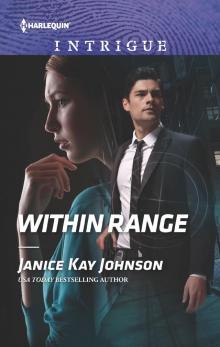 Within Range
Within Range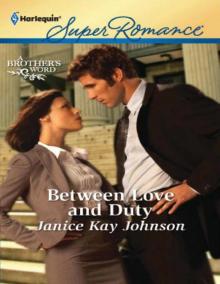 Between Love and Duty
Between Love and Duty First Comes Baby
First Comes Baby Charlotte's Homecoming
Charlotte's Homecoming In A Heartbeat (HQR Superromance)
In A Heartbeat (HQR Superromance)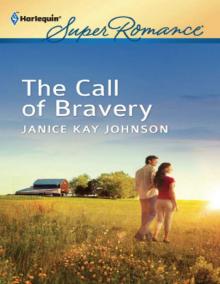 The Call of Bravery
The Call of Bravery In Hope's Shadow
In Hope's Shadow Anything for Her
Anything for Her Harlequin Superromance September 2014 - Bundle 1 of 2: This Good ManPromises Under the Peach TreeHusband by Choice
Harlequin Superromance September 2014 - Bundle 1 of 2: This Good ManPromises Under the Peach TreeHusband by Choice The Baby Agenda
The Baby Agenda More Than Neighbors
More Than Neighbors Her Amish Protectors
Her Amish Protectors All That Remains
All That Remains Whisper of Revenge (A Cape Trouble Novel Book 4)
Whisper of Revenge (A Cape Trouble Novel Book 4)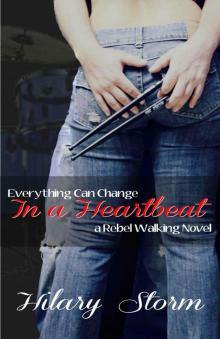 In a Heartbeat
In a Heartbeat A Mother's Claim
A Mother's Claim Because of a Girl
Because of a Girl Back Against the Wall
Back Against the Wall Dangerous Waters
Dangerous Waters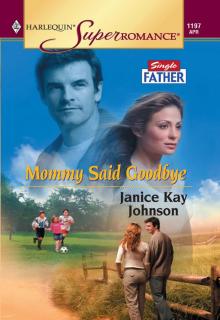 Mommy Said Goodbye
Mommy Said Goodbye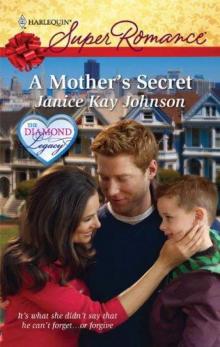 A Mother's Secret
A Mother's Secret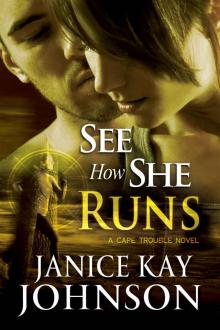 See How She Runs (A Cape Trouble Novel Book 2)
See How She Runs (A Cape Trouble Novel Book 2) Plain Refuge
Plain Refuge Bringing Maddie Home
Bringing Maddie Home For the Girls' Sake
For the Girls' Sake Through the Sheriff's Eyes
Through the Sheriff's Eyes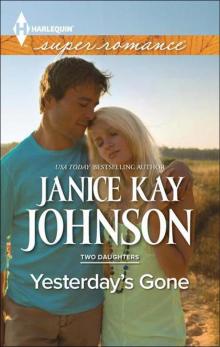 Yesterday's Gone (Two Daughters Book 1)
Yesterday's Gone (Two Daughters Book 1) All a Man Is
All a Man Is Harlequin Superromance January 2014 - Bundle 1 of 2: Everywhere She GoesA Promise for the BabyThat Summer at the Shore
Harlequin Superromance January 2014 - Bundle 1 of 2: Everywhere She GoesA Promise for the BabyThat Summer at the Shore No Matter What
No Matter What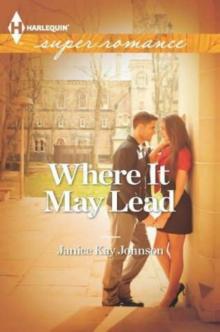 Wakefield College 01 - Where It May Lead
Wakefield College 01 - Where It May Lead Someone Like Her
Someone Like Her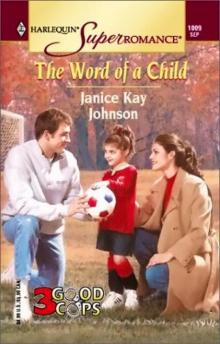 THE WORD OF A CHILD
THE WORD OF A CHILD Harlequin Superromance May 2016 Box Set
Harlequin Superromance May 2016 Box Set Open Secret
Open Secret The New Man
The New Man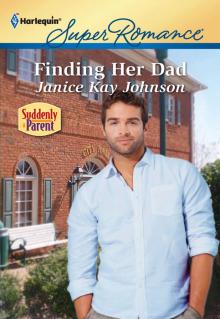 Finding Her Dad
Finding Her Dad The Perfect Mom
The Perfect Mom All Through The House
All Through The House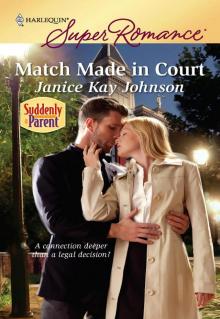 Match Made in Court
Match Made in Court Making Her Way Home
Making Her Way Home From This Day On
From This Day On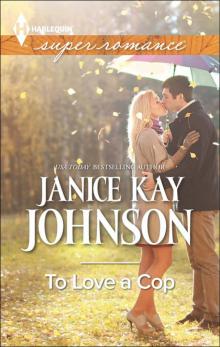 To Love a Cop
To Love a Cop The Hero's Redemption
The Hero's Redemption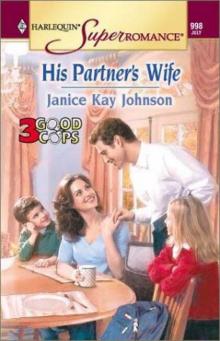 HIS PARTNER'S WIFE
HIS PARTNER'S WIFE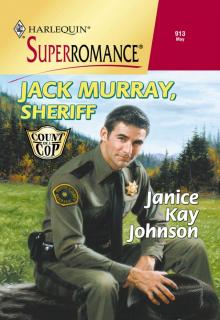 Jack Murray, Sheriff
Jack Murray, Sheriff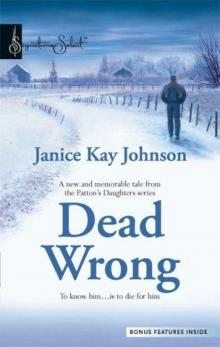 Dead Wrong
Dead Wrong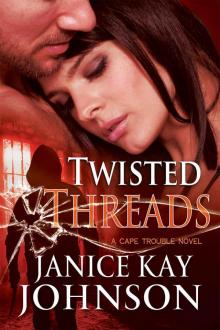 Twisted Threads (A Cape Trouble Novel Book 3)
Twisted Threads (A Cape Trouble Novel Book 3)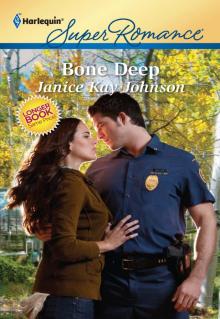 Bone Deep
Bone Deep The Closer He Gets
The Closer He Gets With Child
With Child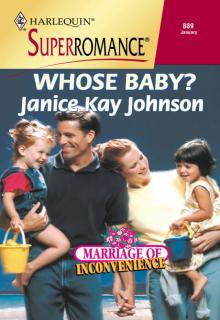 Whose Baby?
Whose Baby? Kids by Christmas
Kids by Christmas